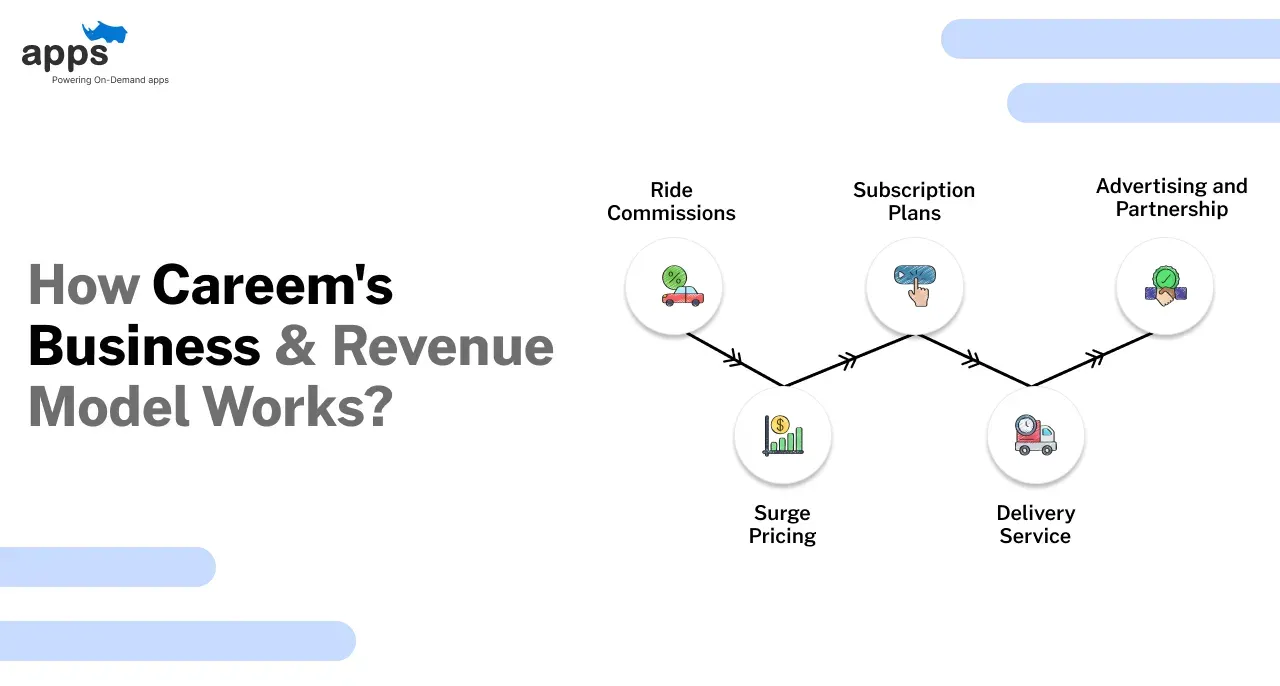- What is Airbnb?
- What is the Airbnb Business Model and How Does It Work?
- Airbnb Business Model Canvas
- Airbnb Revenue Model – How Airbnb Makes Money?
- What is the Airbnb Arbitrage Business Model?
- Challenges and Risks in Airbnb’s Business Model
- The Evolution and Future of Airbnb’s Business Model
- Conclusion
- Frequently Asked Questions (FAQs)
Table of Contents
The Airbnb Business Model: How Airbnb Works and Makes Money

Airbnb doesn’t own a single hotel room, yet it’s one of the world’s largest hospitality companies.
That’s the power of its platform business model, built on connecting hosts and guests instead of owning properties.
What started as two air mattresses in a small apartment is now a global network spanning millions of short-term rentals and long-term stays.
What fueled Airbnb’s rise? It was the smart strategy and vision that made that made this business model and transformed ordinary homes into global stays and travelers into a connected community.
In this blog, you’ll learn how Airbnb works, what the Airbnb business model is, and how it makes money through smart revenue streams like booking fees, guest service fees, and community trust.
What is Airbnb?
Airbnb began in 2008 with a simple idea of renting out a spare room to travelers looking for affordable places to stay. Founded in San Francisco by Brian Chesky, Joe Gebbia, and Nathan Blecharczyk, the company turned that small experiment into one of the world’s biggest peer-to-peer marketplaces.
At its core, Airbnb is a platform business model that connects hosts and guests.
Hosts list their homes, apartments, or rooms, while guests browse and book stays through Airbnb’s mobile app or website.
What makes Airbnb stand out is that it doesn’t own any property. Instead, it acts as a bridge in helping hosts earn from short-term rentals and giving travelers flexible, homelike experiences across 220+ countries.
Now, let’s quickly jump to the next section and understand exactly what business model Airbnb is and what makes it so successful.
What is the Airbnb Business Model and How Does It Work?
The Airbnb business model is built on a simple but powerful concept connecting hosts and guests through a trusted peer-to-peer marketplace. Instead of owning hotels, Airbnb operates as a platform, helping people list, discover, and book unique stays worldwide.
It’s an asset-light model, meaning Airbnb doesn’t own any property. It earns through booking fees, guest service fees, and other revenue streams by facilitating millions of short-term rentals and long-term stays.
Now, let’s see how the Airbnb business model works for both sides.
How Does the Airbnb Business Model Work for Hosts?
Here’s how it works step by step:
- Create a Listing: Hosts sign up, add details, upload photos, set prices, and decide availability.
- Verification: Airbnb verifies listings and hosts to ensure safety and authenticity.
- Receive Bookings: Guests browse and book stays through Airbnb’s mobile app or website.
- Payment Processing: Airbnb securely processes payments, deducting its booking fee before transferring the remaining amount to the host.
- Host the Stay: Hosts welcome guests, provide amenities, and earn ratings after each stay.
- Earn & Manage: Hosts track performance, manage schedules, and improve listings to attract more guests.
This gives property owners, from single-room hosts to property managers, a simple way to earn through Airbnb as a business.
How Does the Airbnb Business Model Work for Guests?
Here’s how it works for guests:
- Search Properties: Guests explore listings filtered by location, budget, and stay type.
- View Details: Each listing includes photos, amenities, ratings, and reviews to help decide.
- Book Securely: Guests confirm and pay directly on Airbnb; the host gets notified instantly.
- Enjoy the Stay: The experience is guided by trust, verified hosts, and customer support.
- Review the Host: After checkout, guests leave feedback that improves platform reliability.
This smooth process, powered by strong technology infrastructure and user experience, is what sets Airbnb apart from traditional rentals.
Through this model, Airbnb transformed from a local startup to a global travel leader operating in 220+ countries.
Up next, we’ll break down the success framework of the Airbnb Business Model Canvas that explains how everything fits together.
Airbnb Business Model Canvas
The Airbnb business model canvas explains how this global platform business model creates, delivers, and captures value within the sharing economy.
It visualizes the nine key components that keep Airbnb’s peer-to-peer marketplace running efficiently across millions of hosts and guests.
Key Partners
Airbnb depends on a vast network of collaborators to keep operations seamless:
- Hosts and property managers who supply listings.
- Payment processors ensure smooth transactions.
- Local authorities manage regulations and safety compliance.
- Travel affiliates who expand their reach through referrals.
- Cleaning and maintenance partners maintain quality standards.
These partnerships allow Airbnb to deliver reliable stays without owning a single property.
Key Activities
Airbnb’s daily operations revolve around keeping its marketplace safe, scalable, and engaging.
Key activities include:
- Maintaining the website and mobile app.
- Marketing and user acquisition across markets.
- 24/7 customer support for hosts and guests.
- Fraud detection, identity verification, and safety checks.
- Community trust-building through ratings and transparency.
These activities sustain Airbnb’s reputation and ensure a consistent user experience globally.
Key Resources
Airbnb’s biggest resources combine technology and brand equity:
- A robust technology infrastructure, eg, mobile app or web app development, supporting millions of transactions.
- Advanced data analytics and AI-driven recommendations that personalize results.
- A trusted brand reputation built on transparency and community feedback.
- It's a strong global network of hosts and guests.
These resources form the foundation of Airbnb’s competitive edge.
Value Proposition
The value proposition of Airbnb defines why it works for everyone involved:
- For Guests: Affordable, personalized stays and authentic local experiences.
- For Hosts: Flexible income opportunities, global exposure, and easy management tools.
- For Airbnb: A scalable platform business model that grows without asset ownership.
This three-way balance keeps the ecosystem thriving.
Customer Segments
Airbnb serves a broad audience:
- Travelers seeking unique and budget-friendly stays.
- Long-term renters and digital nomads are looking for flexible living.
- Business professionals need short-term corporate housing.
- Hosts and property managers earn income from their spaces.
This variety helps Airbnb adapt to market changes while maintaining steady growth.
Customer Relationships
Trust drives every transaction on Airbnb. Relationships are built through:
- Transparent reviews and rating systems.
- Personalized recommendations via the mobile app.
- 24/7 customer support for conflict resolution.
- Community events that strengthen connections between hosts and travelers.
These practices keep both sides loyal and engaged.
Channels
Airbnb connects users through digital-first platforms:
- It has a website and mobile app for bookings and management.
- Social media for brand visibility.
- Referral programs and affiliate networks to attract new users.
These channels support Airbnb’s global expansion and streamline discovery for both hosts and guests.
Cost Structure
Airbnb’s main costs ensure smooth operations at scale:
- Platform development and feature updates.
- Technology infrastructure and cybersecurity.
- Marketing and partnership management.
- Customer service and host verification.
- Compliance with local regulatory environments.
These expenses sustain the platform’s reliability and growth.
Revenue Streams
Airbnb’s revenue model is diverse and steady:
- Booking fee charged to hosts.
- A guest service fee is applied to travelers.
- Paid marketing assistance and Airbnb Experiences for hosts.
- Premium services such as Airbnb Plus and property insurance programs.
These revenue streams power a scalable and profitable business without property ownership. The Airbnb business model shows how smart design, technology, and trust can turn a simple idea into a global travel revolution.
Next, we’ll explore exactly how Airbnb makes money through its detailed Airbnb Revenue Model.
Airbnb Revenue Model – How Airbnb Makes Money?
The Airbnb business model connects hosts and guests through a platform business model, earning from booking fees, guest service fees, and premium programs.
This flexible Airbnb revenue model helped the brand grow into one of the biggest names in the sharing economy.
Booking Fee and Guest Service Fee Explained
The primary source of income in the Airbnb business model is the per-booking fee.
Here’s how it works:
- Booking Fee (Host Side): Airbnb charges hosts a standard service fee, usually around 3% of the total booking value. This helps cover payment processing and platform operations.
- Guest Service Fee (Guest Side): Guests pay an additional 6–12% service fee when booking. This fee supports customer service, trust programs, and improvements to the user experience.
By taking a small share on both sides, Airbnb keeps prices competitive while maintaining consistent revenue from millions of short-term rentals and long-term stays worldwide.
Airbnb Experiences and Program Revenue
Airbnb has expanded its revenue streams through unique offerings beyond property stays:
- Airbnb Experiences: Guests can book local tours, workshops, and cultural events hosted by locals. Airbnb earns a commission from each booking.
- Airbnb Plus: A premium program for verified, high-quality homes. Hosts pay extra to get their properties listed under Plus, and Airbnb earns from these enhanced listings.
These add-ons increase the value proposition for travelers while diversifying Airbnb’s income beyond accommodations.
Subscription and Advertising Opportunities
Airbnb has explored subscription-based models and promotional options to generate additional income:
- Host Promotions: Some hosts pay to boost their listings or participate in targeted marketing.
- Advertising Collaborations: Partnerships with travel brands and tourism boards help Airbnb reach new audiences while creating mutual marketing opportunities.
Though still evolving, these features reflect how Airbnb is testing new ways to strengthen its platform business model and expand revenue streams.
New Revenue Channels: Airbnb Arbitrage and Long-Term Rentals
Airbnb continues to grow by adding new revenue streams that fit changing travel trends. Two key additions to the Airbnb business model are Airbnb arbitrage and long-term rentals.
- Airbnb Arbitrage Business Model: Entrepreneurs or property managers rent properties long-term and sublet them on Airbnb for shorter stays. The profit comes from the difference between rental costs and total guest bookings.
Airbnb earns through booking fees and guest service fees on every transaction, making it a smart platform business model for both hosts and investors. - Long-Term Rentals: With remote work and flexible lifestyles on the rise, many travelers now prefer extended stays. Airbnb's business model allows hosts to list long-term rentals, creating stable income for owners and consistent revenue for the platform.
These additions help Airbnb diversify its revenue streams, attract more hosts and guests, and strengthen its global presence in the sharing economy.
What is the Airbnb Arbitrage Business Model?
The Airbnb arbitrage business model means renting a property long-term and re-listing it on Airbnb for short-term stays. The profit comes from the gap between the monthly rent and what guests pay for multiple bookings, creating new revenue streams without ownership.
Here’s how the Arbitrage Business Model works:
- Rent a property in a high-demand area.
- Get landlord approval and comply with local regulations.
- List on Airbnb, manage guests, and optimize pricing.
Arbitrage Business Model Benefits:
- Investors who can scale quickly without heavy upfront costs.
- Property Managers, who earn extra income through efficient occupancy.
- Hosts who learn the business before buying real estate.
Airbnb arbitrage proves how adaptable the Airbnb business model is for modern entrepreneurs.
Partnerships and Marketing Strategy
Airbnb built global trust through collaborations, storytelling, and user-focused campaigns that improved its user experience and fueled global expansion.
Let’s look at how its strategy helped it stand out in the crowded travel market.
Global Collaborations
Airbnb partnered with brands like TripAdvisor, Virgin America, and city tourism boards to reach new travelers. These alliances increased visibility and strengthened trust among local communities and regulators.
Referral and Loyalty Programs
Airbnb uses referral incentives that reward both existing and new users. This approach helped the platform grow organically and retain loyal hosts and guests worldwide.
Storytelling and Brand Campaigns
Airbnb’s “Belong Anywhere” campaign focused on emotional storytelling, making users feel part of a global community. This people-first message set it apart in every competitor analysis, building a relatable and memorable brand.
Influencer and Digital Marketing
Airbnb taps into influencer partnerships and personalized ads to attract travelers.
Its data-driven campaigns use social media and search platforms to target audiences across regions, improving engagement and user experience.
Through these strategies, Airbnb strengthened its brand identity and turned trust into its most valuable currency, fueling continued global expansion.
Next, we’ll explore the challenges of scaling such a large platform business model worldwide.
Challenges and Risks in Airbnb’s Business Model
These risks aren’t just theoretical; instead, they impact how Airbnb operates, affect hosts and guests, and shape its long-term strategy.
Regulatory Environment and Legal Restrictions
Many cities are tightening rules around short-term rentals, directly affecting Airbnb’s supply and business model.
- For example, Spain recently targeted around 120,000 Airbnb listings that were deemed illegal.
- In New York City, after the enforcement of Local Law 18, listings dropped from ~60,000 in 2018 to just ~3,000 by 2025, according to Le Monde.
Market Competition and Differentiation
Airbnb faces heavy competition from traditional hotels and other platforms like Vrbo and Booking.com.
- In 2025, Airbnb reported capturing significant market share from hotels and Vrbo.
- While strong growth is encouraging, it also pressures Airbnb to continue innovating and differentiating its value proposition for both hosts and guests.
Trust and Safety Concerns
Trust is central to Airbnb’s platform, but incidents and cancellations can damage reputation and user experience.
- Reviews, guest cancellations, last-minute removal of listings, and property damages all pose ongoing risks.
- Ensuring safety, reliability, and consistency is critical for maintaining the platform’s strength in the peer-to-peer marketplace.
Maintaining Quality During Global Expansion
As Airbnb expands into new markets, it struggles to maintain a consistent standard of quality and user experience.
- One study by Engine found that, despite growth, some hosts are seeing declining occupancy rates due to oversupply.
- Scaling fast without losing the “local, authentic” feel is a key challenge for the platform business model, especially as it balances global reach with personalized stays.
Understanding them is key to grasping how Airbnb navigates growth while staying competitive.
Next, we’ll explore the evolution and future of Airbnb’s business model and how the company adapts to shifting travel trends.
The Evolution and Future of Airbnb’s Business Model
From air mattresses to AI-driven stays, Airbnb has constantly evolved its platform business model and scaled its global expansion while staying in tune with travelers and hosts.
Here are five forward-looking trends shaping the next chapter of Airbnb’s business.
1. The Growth Journey: From Air Mattress to Global Giant
Airbnb now lists over 8 million active listings worldwide and serves 200 million+ users across 220+ countries. Such a scale demonstrates how Airbnb’s model evolved from local disruption to a global leader in the sharing economy.
2. Technological Transformation – AI, Automation, and Enhanced UX
In Q3 2025, Airbnb’s gross booking value grew 14% year-over-year, as the company invests in AI and automation to improve user experience. Features like dynamic pricing and AI-powered search are becoming core to how the business operates.
3. The Shift to Long-Term Rentals and Remote Work Markets
Long-term stays are now a high-growth segment. Monthly rentals on Airbnb reached about 19% of gross nights booked in Q4 2023. This trend blends short-term rental agility with more stable income for hosts and new revenue streams for the platform.
4. Sustainability and Local Community Empowerment
Eco-friendly stays have risen sharply by 141% from 2018 to 2019, signalling demand for greener travel options. Airbnb is focusing on initiatives that empower local hosts, reduce environmental impact, and foster sustainable tourism.
5. Emerging Markets and Diversified Travel Categories
Growth outside core markets is accelerating. For example, nights booked by outbound Chinese tourists rose 25% in Q4, and domestic bookings in Latin America grew 30% according to Reuters reports.
This shows Airbnb’s push into new geographies and travel segments as part of its global expansion strategy.
The Airbnb business model continues to evolve alongside technological advancements, guest expectations, and market shifts.
Conclusion
From two air mattresses in San Francisco to over 8 million listings worldwide, the Airbnb business model proves that innovation, trust, and user experience can reshape entire industries.
Its platform business model turned travel into a connection, showing how simplicity backed by technology can scale globally.
If you’ve ever imagined building your own version of Airbnb, connecting hosts and guests, offering short-term rentals or long-term stays, and driving value through smart revenue streams, the opportunity is right here.
With AppsRhino, you can transform that idea into a powerful, revenue-ready marketplace app that scales quickly, fast, beautiful, and intelligent.
How AppsRhino Helps You Build Your App
Trusted by 200+ global brand such as Authnetic drilling, Khatabook, Apollo, Chattahoot, Woodland and more, AppsRhino has been the trusted partner for years.
Here’s how you can launch smarter and faster with AppsRhino’s advanced features:
- Built-in Monetization: Automate booking fees, guest service fees, and commissions effortlessly.
- Advanced Security: Keep user data safe with multi-layer authentication and encryption.
- Cross-Platform Deployment: Go live on web, iOS, and Android simultaneously.
- Data-Driven Dashboard: Monitor revenue, traffic, and engagement with detailed performance analytics.
- 24/7 Technical Support: Dedicated support team for maintenance, scaling, and troubleshooting.
- Multiple Payment Gateways: Integrate Stripe, PayPal, Braintree, or your preferred option with simple setup.
- Custom White-Label Solutions: Rebrand your platform completely—logo, domain, and dashboard included.
- API-First Architecture: Integrate custom tools and services with ease.
- Multi-Currency & Multi-Language Support: Expand globally without tech barriers.
- Automated Notifications & Marketing Tools: Drive engagement with push notifications, email, and SMS campaigns.
- Faster Go-to-Market Time: Pre-built frameworks and modules to reduce launch time by up to 60%.
With AppsRhino, you get a future-ready, customizable, and scalable peer-to-peer marketplace platform built for growth without the hassle.
Frequently Asked Questions (FAQs)
What is Airbnb’s business model in simple terms?
The Airbnb business model is a platform business model that connects hosts and guests through a peer-to-peer marketplace, allowing property owners to rent spaces and travelers to book stays easily.
How does Airbnb make money?
Airbnb earns revenue from multiple streams, primarily booking fees from hosts and guest service fees from travelers, as well as premium programs like Airbnb Plus and Airbnb Experiences.
What type of business is Airbnb formally known as?
Airbnb is formally known as a two-sided marketplace model, part of the sharing economy, enabling individuals to exchange goods or services directly through a digital platform.
What is the Airbnb arbitrage business model?
The Airbnb arbitrage business model involves renting a property long-term and subletting it for short stays on Airbnb, earning profit from the price difference between rent and bookings.
Can I build an app similar to Airbnb?
Yes, with AppsRhino’s marketplace app development, you can build your own on-demand platform like Airbnb, complete with booking, payments, chat, and scalable backend infrastructure.
Table of Contents
- What is Airbnb?
- What is the Airbnb Business Model and How Does It Work?
- Airbnb Business Model Canvas
- Airbnb Revenue Model – How Airbnb Makes Money?
- What is the Airbnb Arbitrage Business Model?
- Challenges and Risks in Airbnb’s Business Model
- The Evolution and Future of Airbnb’s Business Model
- Conclusion
- Frequently Asked Questions (FAQs)





